Most people often think that the concepts of robots, artificial intelligence, and automated machinery are modern phenomena. In reality, these ideas have appeared in Western literature nearly 3,000 years ago. Long before writer Isaac Asimov devised the Three Laws of Robotics (1942) and computer scientist John McCarthy coined the term “Artificial Intelligence” (1995), ancient Greek mythology was filled with stories about intelligent humanoid beings.
Remarkably, these mythological figures meet enough criteria of modern definitions of robots and AI. Yet, what is even more astonishing is that these fairy tales can still provide us with valuable lessons and deeper insights about today’s artificial intelligence.
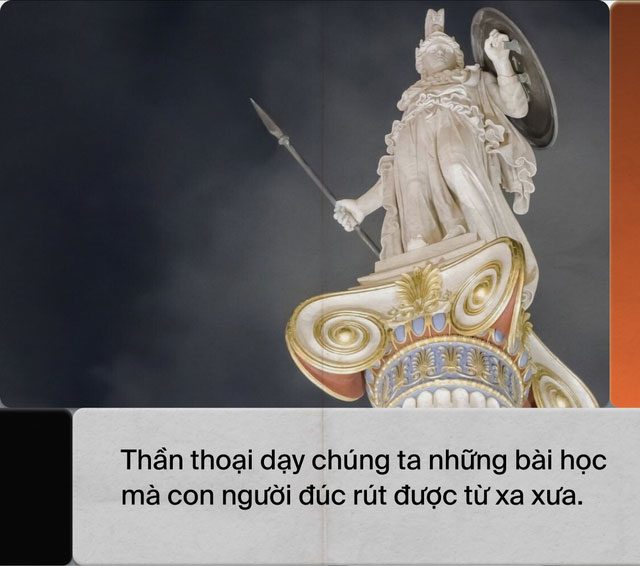
According to researchers, the desire to surpass humanity and create non-biological life by equipping machines with intelligence seems to be an innate part of human nature, from ancient times to the present. This is why we need to seek further knowledge about contemporary AI in these ancient mythological stories.
Through dilemmas, sometimes frightening, the hopes and moral lessons they convey, these stories can provide us with another way to address some of the most pressing questions related to intelligent machinery: How far should we go with AI? And what is the true moral meaning of these technologies?
Now, let’s explore three representative AI figures from Greek mythology: Golden Maidens, Talos, and Pandora.
Golden Maidens: The Need for Labor-Saving Technologies
The Golden Maidens were created by Hephaestus, the god of craftsmanship, including forging, handicrafts, sculpture, metallurgy, and fire. They are described as golden female assistants, resembling young living girls. Interestingly, they could anticipate and meet the needs of their creator.
As historian Adrienne Mayor writes in her book Gods and Robots: Myths, Machines, and Ancient Dreams of Technology, the most important aspect of the Golden Maidens is that “they were endowed with distinctive human traits: consciousness, intelligence, the ability to learn, reason, and speak.”
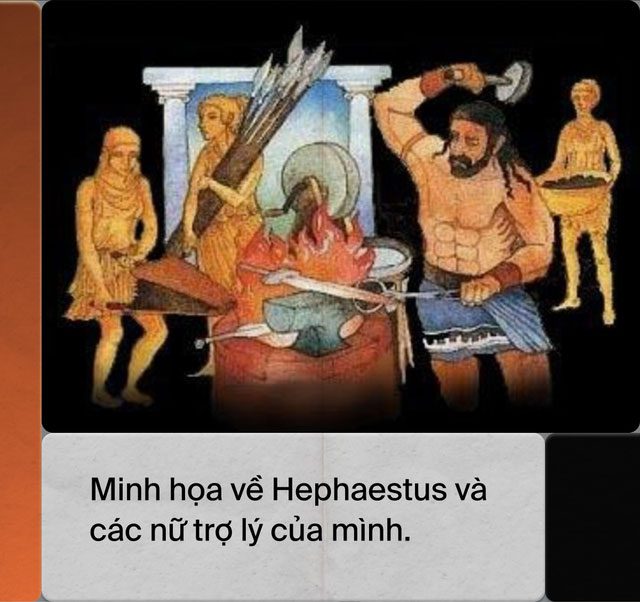
Here, we can immediately recognize a similarity between ancient mythology and modern society. That is one of the main reasons for creating intelligent, automated machinery is economic efficiency, or rather, the ability to save labor.
The idea that robots or devices can act autonomously as servants (or slaves) is also a point emphasized by the famous Greek philosopher Aristotle. In the first book titled Politics, he pondered: “If every tool could do its work of its own accord, following or anticipating the needs of others…”
This idea, although ahead of its time, is essentially very simple. It envisions a society where humans do not have to perform laborious tasks but instead delegate these jobs to machines. Just like ancient Greek society, we today are also creating a class of “servants” made by machines.
Consider the vacuum robots tirelessly moving back and forth to clean rooms for you, surgical robots performing complex operations, or military robots designed for bomb disposal.
This naturally raises an interesting question. While robots can assist us with minor tasks, as automation becomes more widespread, industries may face the risk of being destroyed and the workforce will be impacted. For instance, consider self-driving cars that could lead to job losses for drivers. But these concerns might be brushed aside once the profits from such moves are funneled into the hands of those who benefit, as that is when the privileged and wealthy (here represented by Hephaestus) stand to gain the most.
To gain a clearer understanding of this idea, let’s move on to the next mythological story.
Talos: The Intelligent Machine in the Hands of a Tyrant
Unlike the Golden Maidens, Talos was created to cause harm.
He was a giant bronze robot, again crafted by Hephaestus. Talos was given by the god Zeus to his son Minos, the mythological king of Crete, with the task of guarding and protecting the island.
This guardian robot would hurl massive stones at ships approaching the island, and if enemies landed, it would rush to embrace them and incinerate them with its ability to heat its bronze body.
Talos does not seem to possess human-level intelligence, but it can interact with its environment and perform various tasks.
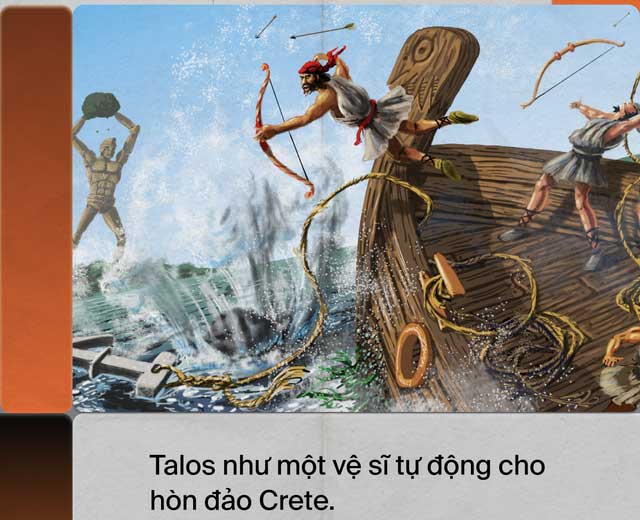
In fact, some mythological variations regarding Talos’s death significantly suggest its awareness of its existence and that this robot possessed a form of self-determination.
In these mythological versions, Talos is portrayed as being susceptible to human fears and hopes, endowed with a form of will and intelligence.
Now, upon closer examination of relevant mythological data, one may notice that all machines used in this way belong to rulers. In Talos’s case, that is King Minos.
And there is a notable lesson in these stories. Superior technology can help someone exert absolute control.
For instance, think of military robots that have been utilized since World War II. In some recent wars or conflicts, the battlefield has almost turned into a testing ground for autonomous combat vehicles and drones supported by AI. They partially reflect the excitement of military leaders about the potential usefulness of artificial intelligence technology. And AI is not only serving those in power during wars but also in everyday life.
At the same time, the application scope of AI in areas like healthcare, finance, and e-commerce is also shaping a new battlefield of geopolitical power.
According to analysts, the dominance of AI by powerful nations is expected to deepen structural inequalities and contribute to new forms of economic and social imbalance. Similarly, since AI is primarily centralized (meaning it is limited to the ownership rights of a single entity), it will continue to empower the leading tech companies that create it, allowing them to pursue their own agendas.
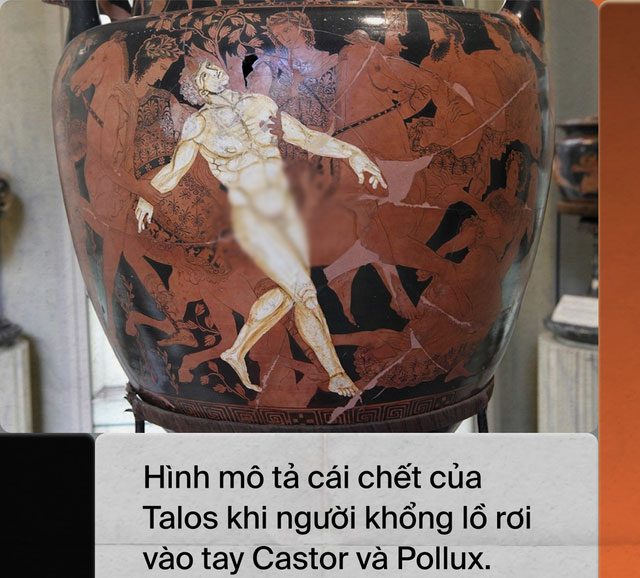
But have these consequences been sufficiently debated by the regulatory bodies of nations or the companies currently developing AI?
“I think Silicon Valley and Big Tech companies, as well as billionaires, have controlled the narratives about AI to the extent that we have very little room for the necessary debates about such a rapidly developing technology,” shares George Zarkadakis, an AI engineer, futurist, and author.
Unless regulated, legally managed, and removed from the hands of individuals, AI tools will not benefit society in the way we envision. The risk of them falling into the hands of unscrupulous individuals, who could use them to assert dominance, is underscored by the third mythological story that follows.
In this tale, the fear of losing dominance led the god Zeus to create an extremely dangerous weapon: Pandora’s Jar.
Pandora: When AI Exceeds Limits
Pandora was created as a tool of punishment. After Prometheus, one of the Titans from Greek mythology whose name means “foreknowledge,” stole fire from the gods and gave it to humanity to help them create technology, Zeus ordered Hephaestus to create Pandora.
Pandora was designed to be a curse and was disguised as a gift. It was meant to make humanity pay for reaching out to fire and technology, which at that time were considered the exclusive privileges of the gods.
Hephaestus shaped Pandora from clay and water into the form of a beautiful woman. She was also endowed with treachery, deceit, and seduction. Finally, Zeus gave her a mysterious jar.
After that, Pandora was sent to Prometheus’s brother, Epimetheus (a name meaning “regret for what has happened”), who forgot the warning not to accept gifts from Zeus. Upon arriving on Earth, Pandora opened the jar (some versions say it was a box) and unleashed all kinds of evils that would plague humanity forever. Following Zeus’s instructions, she sealed the jar just before Hope could escape, trapping it inside.
“It is unclear whether Pandora had the capacity to learn, choose, or act autonomously,” historian Mayor notes. “Her only task was to open the jar containing all human misfortunes.”
And in modern terms, she did exactly what she was “programmed” to do.
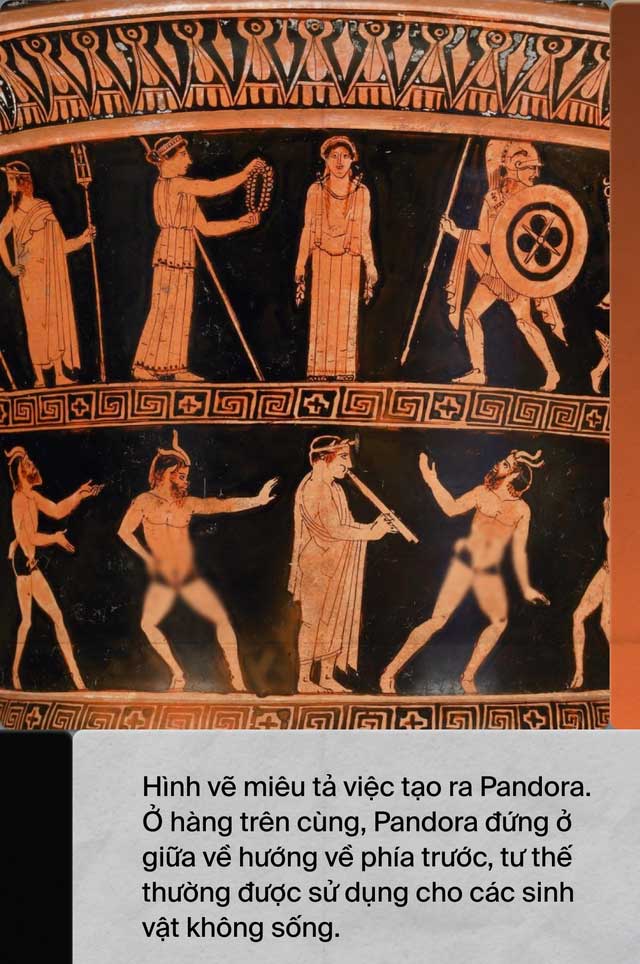
An essential element of Greek mythology, fully represented in the story of Pandora, is the concept of hubris. This refers to an act of violating the natural order by disregarding the sacred limits that have been set. In this case, it is humanity’s hubris and the result is Zeus’s punishment to restore balance through Pandora’s jar.
According to technology expert Zarkadakis, there is a great deal of hubris in the field of AI as well. As machines become nearly indistinguishable from humans and can be smarter than humans, “they will be like a god,” he adds.
Zarkadakis believes that ancient myths are trying to prevent us from entering that “slippery slope” while pursuing AI to the fullest. Nevertheless, despite the warnings, the whole world is racing in that direction. And AI is like a Pandora’s jar waiting to be opened, or perhaps it has already begun to be opened in the present.
“The development of complete artificial intelligence could mark the end of humanity,” Steven Hawking warned in an interview during his lifetime. “It will self-develop and self-design at an ever-increasing rate. Humans, who are limited by the slow process of biological evolution, will not be able to compete and will be replaced.”
So, should we open Pandora’s jar?
Our choice is not much different from Epimetheus’s choice. AI comes with a “black box,” which is the machine learning process of Deep Neural Networks. This means that while scientists have access to the input and output data that AI uses, they do not know how its decision-making process works.
We do not know what is inside the “black box,” just as Epimetheus did not know what was inside Pandora’s jar. The moral lesson here is very clear: Think before you act, or act without thinking and face the consequences.
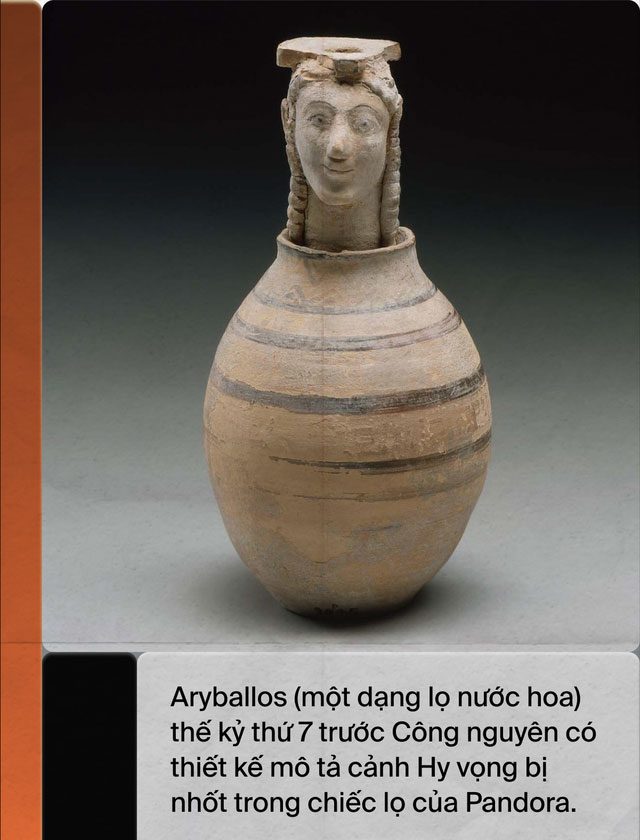
To relate this to modern debates today, unless we seriously consider the potential negative outcomes, it is very dangerous to immerse ourselves in creating something we do not fully understand simply because we can create it.
“A machine with complete autonomy and consciousness means it is entirely free; it can think in any way and thus, it can be dangerous,” Zarkadakis states. “The number one risk is extinction, and theoretically, trying to build such an AI and see what happens is very perilous.”
Zarkadakis adds that the reason humans are fully autonomous is that as social beings, we are equipped with ethics and morality.
However, teaching ethics and morality to AI systems has not yet been successful. For instance, the 2016 racial discrimination scandal of Microsoft’s chatbot Tay, or the hidden hate in Scatter Lab’s Lee Luda chatbot in South Korea. Most recently, there was the scandal involving Meta’s Galactica system.
Zarkadakis believes we do not actually need conscious AI. He remarks: “Artificial intelligence has many benefits to help us achieve goals. What we need to do is to socially integrate AI, and we should completely rethink the autonomy of machines and revise their statements.”
With this approach, in fact, AI could be an ally of Pandora. That is, turning it into a tool to help humanity and the world become a better place.
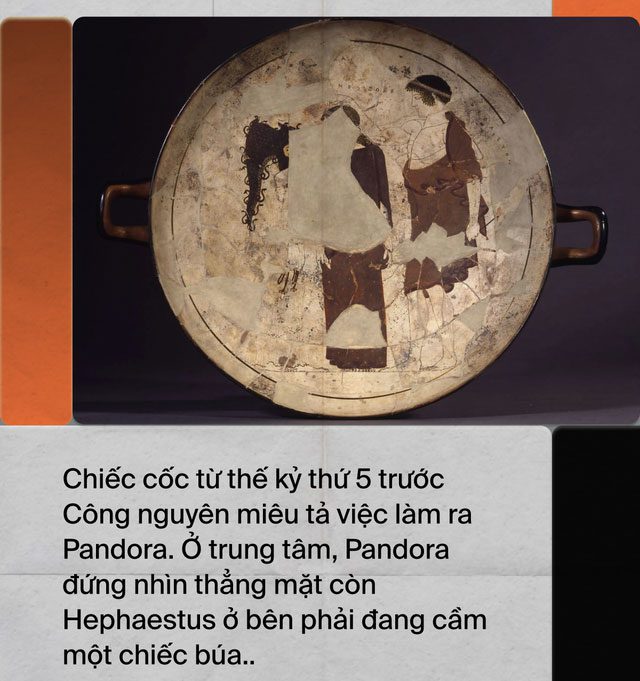
From Mythology to Reality
Thousands of years ago, the three mythological stories mentioned illuminated the potential of intelligent machines to serve noble purposes (as in the case of the Golden Maiden) or cause harm (as in the cases of Talos and Pandora). And those are the potentials we see being realized today.
However, more importantly, they also raise a series of important questions for our pursuit of AI: Who will AI serve, from whom will AI learn, what do we want AI to be, and how far should we go with AI before crossing limits?
Ultimately, AI is like Pandora’s mysterious jar. We do not know what is inside, and we can assume it contains both good and evil. And in the end, what role do we want to play in this story: Will we be like Prometheus and show foresight, or will we be like Epimetheus and always act before considering the consequences?
Ancient Greek mythology has warned us about the dangers of AI; now, it is our duty to listen carefully.


















































